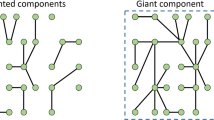Abstract
We examine the relationship between dependence logic and game logics. A variant of dynamic game logic, called Transition Logic, is developed, and we show that its relationship with dependence logic is comparable to the one between first-order logic and dynamic game logic discussed by van Benthem. This suggests a new perspective on the interpretation of dependence logic formulas, in terms of assertions about reachability in games of imperfect information against Nature. We then capitalize on this intuition by developing expressively equivalent variants of dependence logic in which this interpretation is taken to the foreground.

Similar content being viewed by others
Notes
In general, we will assume through this whole work that all first-order models which we are considering have at least two elements. As one-element models are trivial, this is not a very onerous restriction.
This requirement is nothing but a formal version of Zermelo’s Theorem: if one of the players cannot force the outcome of the game to belong to a set of “winning outcomes” \(X\), this implies that the other player can force it to belong to the complement of \(X\).
van Benthem et al. (2008) gives the following alternative condition for the powers of the universal player:
-
\(s \rho ^A X\) if and only if \(X = Z_1 \cup Z_2\) for two \(Z_1\) and \(Z_2\) such that \(s \rho ^A_1 Z_1\) and \(s \rho ^A_2 Z_2\).
It is trivial to see that, if our games satisfy the monotonicity condition, this rules is equivalent to the one we presented.
-
The term “trump” is taken from Hodges (1997), where it is used to describe the set of all teams which satisfy a given formula.
Here we write \(A \uplus B\) for the disjoint union of the sets \(A\) and \(B\).
That is, such that \(X(x)\) is a set of states of the transition model.
A moment’s thought shows that, by downwards closure, the condition \(z \not = y\) in the second disjunct can be removed, but for simplicity we will keep it.
For example, consider the formula \((\exists x Px) \wedge Qx\): by the rules given, it is easy to see that \(M \models _s (\exists x Px) \wedge Qx\) if and only if \(P^M \cap Q^M \not = \emptyset \), that is, if and only if \(M \models _s \exists x (Px \wedge Qx)\), differently from the case of Tarski’s semantics.
References
Dekker, P. (2008). A guide to dynamic semantics. ILLC Prepublication Series (PP-2008-42).
Engström, F. (2012). Generalized quantifiers in dependence logic. Journal of Logic, Language and Information, 21(3), 299–324.
Galliani, P. (2011). Multivalued dependence logic and independence logic. In: Non-classical modal and predicate logics.
Galliani, P. (2012). Inclusion and exclusion dependencies in team semantics: On some logics of imperfect information. Annals of Pure and Applied Logic, 163(1), 68–84.
Grädel, E., & Väänänen, J. (2013). Dependence and independence. Studia Logica, 101(2), 399–410.
Groenendijk, J., & Stokhof, M. (1991). Dynamic predicate logic. Linguistics and Philosophy, 14(1), 39–100.
Henkin, L. (1961). Some remarks on infinitely long formulas. In: Infinitistic Methods. Proc. Symposium on Foundations of Mathematics (pp. 167–183). Oxford: Pergamon Press.
Hintikka, J. (1968). Language-games for quantifiers. In: American philosophical quarterly monograph series 2: Studies in logical theory (pp. 46–72). Oxford: Basil Blackwell.
Hintikka, J. (1996). The principles of mathematics revisited. Cambridge, MA: Cambridge University Press.
Hintikka, J., & Sandu, G. (1989). Informational independence as a semantic phenomenon. In J. Fenstad, I. Frolov, & R. Hilpinen (Eds.), Logic, methodology and philosophy of science. Amsterdam: Elsevier.
Hodges, W. (1997). Compositional semantics for a language of imperfect information. Journal of the Interest Group in Pure and Applied Logics, 5(4), 539–563.
Kontinen, J., & Nurmi, V. (2009). Team logic and second-order logic. In: H. Ono, M. Kanazawa, & R. de Queiroz (Eds.), Logic, language, information and computation, Vol. 5514 of Lecture Notes in Computer Science (pp. 230–241). Berlin: Springer.
Kontinen, J., & Väänänen, J. (2009). On definability in dependence logic. Journal of Logic, Language and Information, 3(18), 317–332.
Mann, A. L. (2009). Independence-friendly cylindric set algebras. Logic Journal of IGPL, 17(6), 719–754.
Mann, A. L., Sandu, G., & Sevenster, M. (2011). Independence-friendly logic: A game–theoretic approach. Cambridge, UK: Cambridge University Press.
Parikh, R. (1985). The logic of games and its applications. In: Selected Papers of the International Conference on ”Foundations of Computation Theory” on Topics in the Theory of Computation (pp. 111–139). New York, NY, USA.
Väänänen, J. (2007a). Dependence logic. Cambridge, UK: Cambridge University Press.
Väänänen, J. (2007b). Team logic. In J. van Benthem, D. Gabbay, & B. Löwe (Eds.), Interactive logic. Selected papers from the 7th Augustus de Morgan workshop (pp. 281–302). Amsterdam: Amsterdam University Press.
van Benthem, J. (2003). Logic games are complete for game logics. Studia Logica, 75, 183–203.
van Benthem, J., Ghosh, S., & Liu, F. (2008). Modelling simultaneous games in dynamic logic. Synthese, 165, 247–268.
Acknowledgments
The author wishes to thank Johan van Benthem and Jouko Väänänen for a number of useful suggestions and insights. Furthermore, he wishes to thank the reviewers for a number of highly useful suggestions and comments.
Author information
Authors and Affiliations
Corresponding author
Rights and permissions
About this article
Cite this article
Galliani, P. Transition semantics: the dynamics of dependence logic. Synthese 191, 1249–1276 (2014). https://doi.org/10.1007/s11229-013-0327-8
Received:
Accepted:
Published:
Issue Date:
DOI: https://doi.org/10.1007/s11229-013-0327-8



